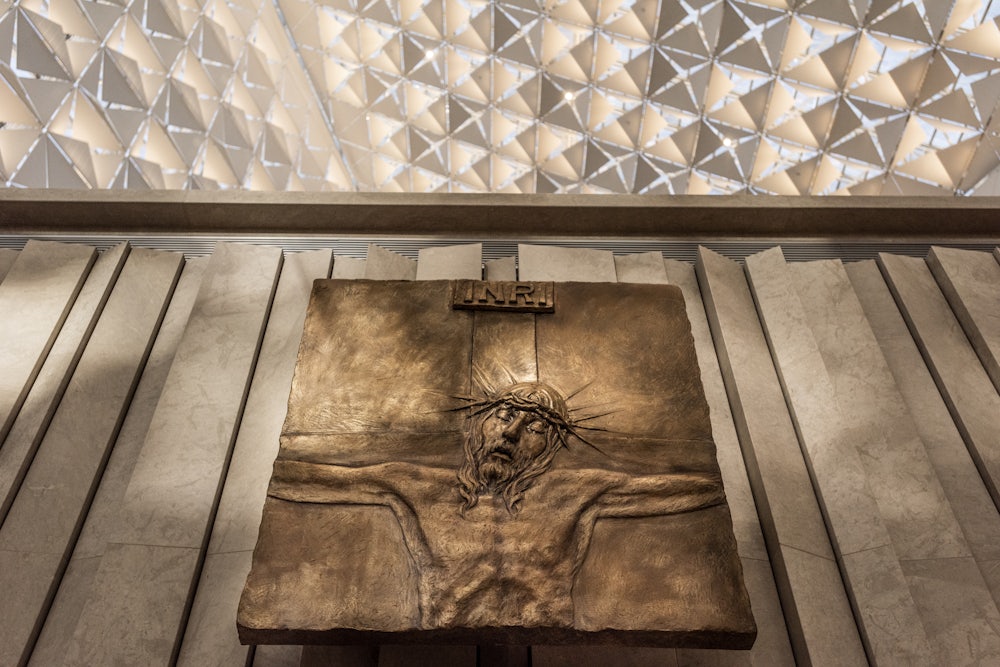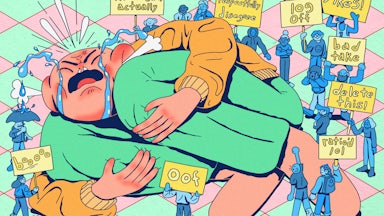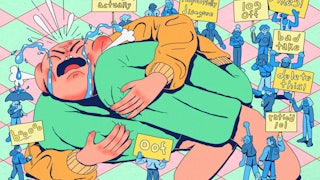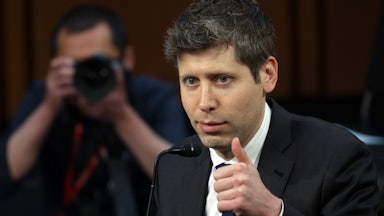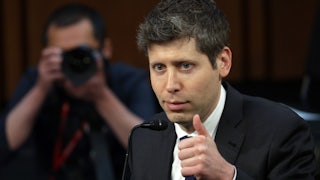“This is what they have done,” Robert Busch writes with weary outrage as he forwards me a photograph of a group of nuns, one of them wearing a “Stop the Steal” button, cheerfully joining President Trump’s January 6 rally in Washington, D.C. Busch, who lives in Redwood City, California, recently formed a study group on economic justice within the Thomas Merton Center, which collaborates with members of the St. Thomas Aquinas Parish in Palo Alto. Like most of his fellow study group members, he calls himself a “Francis Catholic,” in deference to Pope Francis. He has more of a natural affinity with the “Nuns on the Bus”—a Catholic group that advocates for a range of social justice issues—than with the “Stop the Steal” sisters. He usually has at the tip of his tongue a citation from any number of writings in the long tradition of Catholic social teachings. He remains personally opposed to abortion but rejects its political use as a wedge issue.
Just a few miles up the road, in Napa, a man named Timothy Busch—no relation to Robert—hosts annual conferences for Catholic leaders through an organization he co-founded, the Napa Institute. Timothy Busch’s interpretation of the faith is pretty clearly at odds with Robert’s. As Timothy Busch sees it, Catholicism takes a dim view of labor unions and raising the minimum wage, is in favor of “right to work” laws, and absolutely rejects political leaders who fail to be strictly anti-abortion. “Capitalism and Catholicism,” he has said, “can work hand in hand.” In 2017, he greeted the inauguration of President Trump by declaring that a “time of light” was now at hand, which he contrasted with “a time of darkness,” by which he apparently meant the Obama presidency.
There is one other difference between these two Busches, and it may be the one that matters most. It comes down to the fact that Timothy has much more wealth at his disposal than Robert, and he does not hesitate to put his money in service to his version of the faith.
The tale of the two Busches is in some sense the story of the Catholic Church in the United States today. Although American Catholics are culturally and theologically diverse, they are increasingly split along political lines. They are the “jump ball” of American politics, in the words of right-wing political operative Ralph Reed. They are divided over some teachings of Pope Francis, over America’s culture wars, and over the right way to bear witness to their faith in public life.
They are also divided over the Catholic bona fides of President Joe Biden. A lifelong practicing Catholic, Biden tapped the Jesuit priest Father Leo O’Donovan to deliver the invocation at his inauguration and has been hailed by millions of Catholics—about half of whom supported him in the 2020 presidential election—as one of their own. Yet he is frequently castigated by reactionaries as a “fake Catholic.” In January 2021, Jose H. Gomez, the archbishop of Los Angeles and president of the U.S. Conference of Catholic Bishops, warned that Biden “would advance moral evils” with his support for birth control and other reproductive rights and his approval of marriage equality.
The hardening schism in American Catholicism is shaping up to be a test of the influence of liberal Catholicism and the liberal left more broadly. It pits a loosely organized cultural and theological movement against a well-oiled and well-funded political movement on the right—the latter a testament to conservative Catholicism’s commitment to a politics of money and power.
Robert Busch works in development at Stanford University. Edna Jamati, another of the dozen-odd members of the Thomas Merton study group, is a retired nurse. Another member, Vicki Sullivan, is a grandmother who attends Mass several times a week. Shannon Griscom is a retired teacher. Their group represents a cross-section of the Catholic laity in their community, says Busch, which is to say that they are mostly middle-class, if rather whiter, older, and more educated than the median resident.
Timothy Busch, on the other hand, is very wealthy. He inherited part of an upscale Midwestern grocery store chain founded by his father. He is the founder and owner of a high-net-worth estate planning firm that has also facilitated a number of notable real estate transactions, including the formerly named Crystal Cathedral, now Christ Cathedral, in Orange County, California. Timothy Busch is also CEO of a company that owns and operates a collection of hotels and luxury resorts. And he is not shy about putting his money where his convictions lie.
Timothy Busch is the chairman and co-founder the Napa Institute, a foundation that hosts $2,600-a-head gatherings that bring together a leadership cadre of conservative theologians and think-tank fellows, members of the donor class, Republican politicians like Senator Lindsey Graham and former Wisconsin Governor Scott Walker, and clerics. Timothy Busch is also an active member of Legatus, a Catholic lay organization founded in 1987 by Domino’s Pizza titan Thomas Monaghan, whose membership is limited to extremely wealthy business leaders. He sits on the board of Eternal Word Television Network, or EWTN, a Catholic communications network that claims to reach an audience of 250 million worldwide. Together with Charles Koch—whom he has praised as “the refounder of America”—he provided, through his family foundation, a $15 million gift to the Busch School of Business at the Catholic University of America in Washington, D.C., which he promised would become a “teaching pulpit” for Catholic bishops and the Vatican, “especially on the issue and topics of business.”
Timothy Busch has no doubt about the value of wealth in advancing religious goals. “The evangelization of our country is being done by private foundations, Catholic NGOs like Napa Institute and Legatus,” he has said. “They have access to capital that the church doesn’t.”
Robert Busch, for that matter, doesn’t have access to that kind of capital either. If the study group at the Thomas Merton Center were engaged in a battle of ideas with the Napa Institute, Robert figures, “I would like our odds.” But this isn’t a battle of ideas; it is a battle between ideas and money. “When a small cadre of the superwealthy has undue influence, where is the will of the Pope and the people in the pews?” he asks. “They think that because they have money in their pockets, they should have the church in their pockets, too.”
The Thomas Merton group is determined to push back on efforts to drag its faith to the right. With modest support from members of his parish, Robert plans to launch a virtual gathering spot for socially liberal Catholics. The aim is to offer highly interactive worship services—e.g., Masses via Zoom—as well as breakout sessions, forums on themes from racial justice to voting rights to food security, and opportunities for social engagement and volunteerism. “This platform will give tangibility to what our Thomas Merton group is working on,” says Robert Busch. “A social justice clearinghouse and rallying point for Pope Francis Catholics to unabashedly present the social gospel as part and parcel of our faith.”
The initiative would add to an existing collection of dozens of liberal Catholic organizations, such as NETWORK Lobby for Catholic Social Justice, DignityUSA, Call to Action, Catholics for Choice, and the aforementioned Nuns on the Bus. Yet it is important to note that the Catholic left is not the symmetrical “other” of the Catholic right. While the religious left and right are often paired and contrasted in their theological and cultural orientation, the religious left is underfunded and comparatively under-centralized and has a tendency toward volunteerism, declarations, and marches. The religious right, in contrast, is more interested in dominating the nerve centers of influence and owes its current strength to decades of investment in a sophisticated suite of tools, including data, media, and messaging, that drive voter mobilization.
The extreme financial imbalance is something more than merely another factor in the culture war within Catholicism. It is in an important sense the cause of the war itself.
A milestone event in the tale of the two Busches occurred in 1986, when America’s National Conference of Catholic Bishops, concerned about the impact of Reagan’s trickle-down economic ideology, issued a pastoral letter calling on Catholics to pursue “economic justice for all.” The letter took its inspiration from that part of the gospel of Matthew 5:5, “Blessed are the meek”—and it set off five-alarm fire bells in some conservative precincts.
Even before the bishops got the final draft of their letter into print, the conservative theologian Michael Novak published a lengthy critique from his perch at the American Enterprise Institute. Novak argued that the authors had “an inadequate grasp of crucial concepts such as enterprise, markets, and profits,” while their descriptions of poverty, unemployment, and taxation “remain significantly one-sided.”
Over subsequent decades, escalating inequality has yielded a significant number of ultrawealthy individuals who heeded Novak’s call to defend capitalism against the depredations of the social gospel. Joining Timothy Busch and Thomas Monaghan are individuals such as Sean Fieler, a private equity hero described by Inside Philanthropy in 2015 as an “ideologically motivated funder” of ultraconservative Catholic groups, and Frank Hanna, a subprime credit card mogul. Others play a role in directing the flow of funds, such as former political operative Carl Anderson, under whose leadership the Knights of Columbus, a lay fraternal organization founded in the nineteenth century to aid Catholic immigrants and families, has donated millions of dollars to a range of reactionary legal, policy, and media organizations. With the backing of these and like-minded, deep-pocketed donors, a thousand think tanks, foundations, and other nonprofits blossomed across the cultural landscape.
At the very same time that big money was on the rise, the power of the Catholic hierarchy was on the wane. The consequence, as Stephen Schneck, executive director of Franciscan Action Network, tells me, has been “a transfer of power from church hierarchy to wealthy laity, who are in a sense developing a parallel establishment to the official church, an alternate magisterium, because their resources are so tremendous.”
The intellectual world of the extreme Catholic right today is the world that big money made. This phenomenon has been deftly cataloged in a series of articles in the National Catholic Reporter. Among the beneficiaries of plutocratic largesse, as NCR staffers Heidi Schlumpf, Tom Roberts, and Michael Sean Winters have documented, are the legal advocacy group Becket, which was instrumental in extending religious privileges to corporations in the Burwell v. Hobby Lobby Stores, Inc. case; the Federalist Society, which plays an outsize role in grooming and promoting conservative justices; First Things, the journal founded by Richard John Neuhaus, which, under its new leader, R.R. Reno, appears to have reinvented itself as a center for pro-Trump theology; Courage International, an organization that encourages gay Catholics to remain celibate; FOCUS, which targets college students with conservative messaging; the Witherspoon Institute, co-founded by Princeton University–based professor and activist Robert P. George; and the Acton Institute, a Michigan think tank co-founded and headed by Reverend Robert A. Sirico, who champions the union of libertarian ideology and “the Judeo-Christian tradition” and frequently appears on Fox News.
The jewel in the crown is EWTN Global Media. Just prior to the 2020 election, President Trump’s approval rating among Catholics, at about 44 percent, was scarcely distinguishable from that in the general population. But you wouldn’t know that if you watched only EWTN, which Heidi Schlumpf characterized as “the ‘Fox News’ of religious broadcasting.” Robert Busch draws a straight line connecting EWTN’s wealthy backers and the Stop the Steal nuns. “The wealthy right-wing activists who sit on the board of EWTN and remade it into their media mouthpiece,” he said, are “complicit in fueling the flames, over many years, which led to the violence and death of January 6.”
At these exalted levels of highly financed religion, it is as if the Protestant Reformation never happened. The funders of the Acton Institute include not just Timothy Busch but also members of the Prince-DeVos family, who are vocal members of the Christian Reformed tradition; and Charles Koch, along with his late brother, David, who happened to be, among other things, pro-choice. Another milestone is the 2009 Manhattan Declaration: A Call of Christian Conscience, a manifesto that united the right wings of multiple denominations around issues of common concern including opposition to abortion and same-sex marriage.
In the Trump era, the rightward edge of the Catholic world had few qualms about embracing Christian nationalism. Former Attorney General William Barr, for example, directly tied his reactionary views on modern secularism to his support for authoritarian politics, claiming it was the government’s duty to beat back those using the law “as a battering ram to break down traditional moral values and to establish moral relativism as a new orthodoxy.”
The historical irony in this alliance between hyperconservative Catholicism and Christian nationalism is rich. Earlier iterations of Christian nationalism in the U.S., such as those in the early to mid-nineteenth century, counted among their specific objectives the exclusion of Catholic immigrants from participation in the civic life of America. But the convergence of religious extremism and the new American authoritarianism is hardly surprising. Whatever the denominational label on the door, the gospel of wealth usually lands on the same doctrines. It sees wealth as evidence of divine favor, blames poverty on the character of the poor, and seeks solutions in punishing those who deviate from the approved forms of religion and prescribed rules of the sexual order.
When I discuss this phenomenon with Robert Busch, his words tumble out in frustration. “They make fun of us as ‘social justice warriors,’ tree-hugging types. What a thing to have in a church—thinking there is fun to be made of people who are out there running food pantries and helping the homeless.” Most people in the pews are interested in the social justice aspects of the faith, he tells me, “but the conservative seminary system, under very conservative leadership, has led to a conservative hierarchy infrastructure. For them, it’s all about personal morality and holiness, with rarely a word about social justice. What a diminishment of the church!”
For Robert Busch, the story in its outlines is as familiar as a morning in Sunday school. He points to the parable of the Good Samaritan who stopped on the road to rescue a stranger attacked by thieves. In a country where the top 1 percent have now amassed more than $34 trillion in wealth, leaving a mere $2 trillion for the bottom 50 percent to share among themselves, he suggests, this seems like a Bible story worth remembering.
